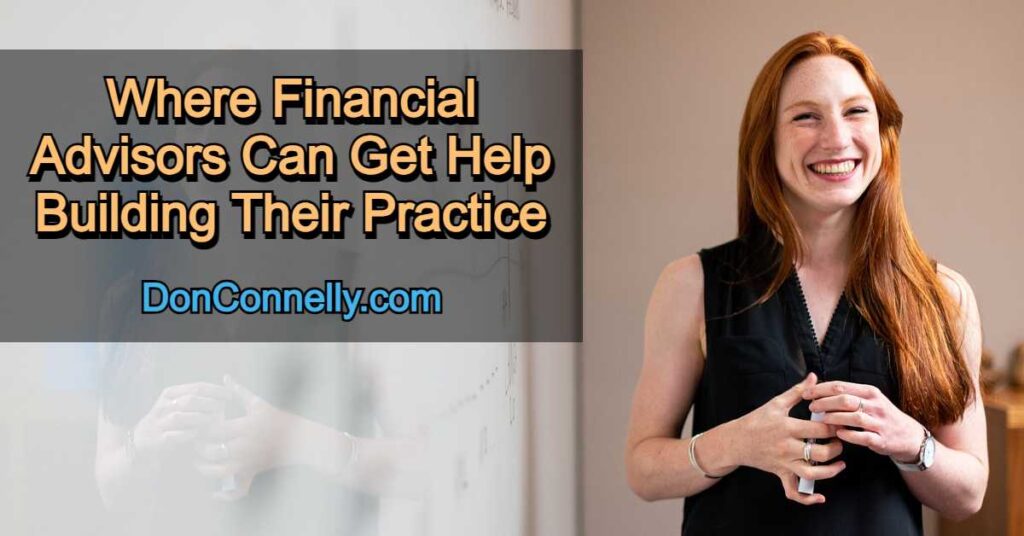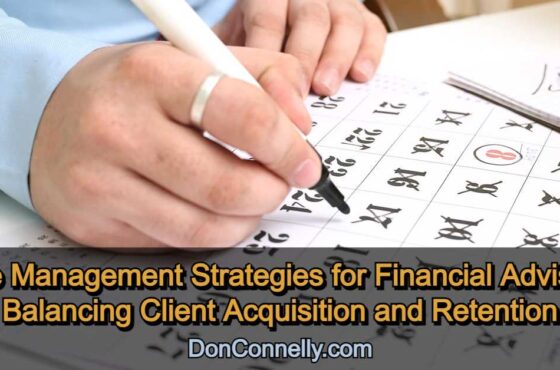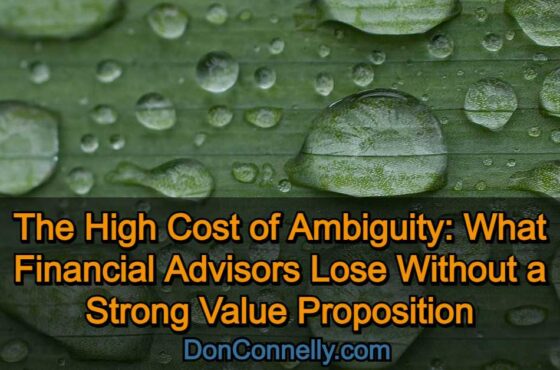Where Financial Advisors Can Get Help Building Their Practice
 Few careers are as demanding as building a successful financial advisory practice. In addition to acquiring essential financial knowledge, financial advisors must develop solid business acumen, hone their soft skills, and work tirelessly to build their clientele while consistently seeking improvement.
Few careers are as demanding as building a successful financial advisory practice. In addition to acquiring essential financial knowledge, financial advisors must develop solid business acumen, hone their soft skills, and work tirelessly to build their clientele while consistently seeking improvement.
This business is not for the faint-hearted, and it’s foolish to think you can do it on your own. I don’t know many successful advisors who made it, especially when starting out, without the benefit of a support system, whether it’s a mentor, coach, accountability partner, or the comradeship of an advisor community.
Each avenue offers unique benefits to help you reach the next level, regardless of your business stage.
#1. Find a mentor
A mentor can be an important source of support and advice. The ideal mentor is a successful advisor who shares your business purpose or vision, someone seasoned in the trials and tribulations of running a business and willing to speak their mind on the positive and negative aspects of your business practices.
In addition to sharing their experience and providing real-world insights, a good mentor offers several benefits:
- Individualized training: A good mentor will schedule time to work with you on specific skills or business issues.
- Networking opportunities: Mentors often have extensive networks in the industry, which they can introduce to their mentees. These connections can be invaluable for career growth, client acquisition, and partnership opportunities.
- Personal development: A good mentor helps with professional growth and encourages personal development. They can help you build confidence, improve decision-making skills, and develop leadership qualities.
- Emotional backstop: A vital benefit of having a mentor is that they are there through your emotional highs and lows—keeping you grounded when you’re winning and boosting your confidence and morale when you’re losing.
#2. Get a coach
While mentorship is more relationship-oriented, coaching is typically more structured and goal-focused. A coach is a professional who works with financial advisors to help them achieve specific business objectives. Often specializing in certain areas, such as business development, client acquisition, or practice management, they use proven methodologies to guide advisors toward their goals.
The benefits of coaching include:
- Accountability: A coach holds you accountable for your progress, ensuring you stay on track with your goals. Regular check-ins and progress reviews help maintain momentum and drive results.
- Strategic planning: Coaches can help you develop and implement business strategies, whether it’s for marketing, sales, or operational efficiency. This strategic guidance is crucial for long-term success.
- Skill development: Coaches can help you develop and hone the soft skills needed to excel in your practice, such as communication, negotiation, and client relationship management.
You can find coaches through industry associations, referrals, or coaching directories. Choosing a coach with a deep understanding of the financial advisory industry and a proven track record of helping advisors succeed is essential.
#3. Find an accountability partner
Everyone, regardless of their business, needs accountability. Most people aren’t very good at holding themselves accountable, so it’s beneficial to have an accountability partner—someone who wants to see you succeed and is willing to hold your feet to the fire.
Unlike a coach or mentor, an accountability partner is usually a peer rather than someone with more experience or expertise. This relationship is based on mutual support, where both parties hold each other accountable for their commitments and progress.
Having an accountability partner provides several benefits:
- Mutual motivation: Having someone to check in with regularly can keep you both motivated and focused on your goals. This mutual support can be beneficial during challenging times.
- Peer learning: An accountability partner can offer new perspectives and ideas, as they are often facing similar challenges. Peer-to-peer learning can lead to creative problem-solving and innovation.
- Consistent progress: Regular check-ins with an accountability partner help ensure your tasks and goals are consistently met. This can prevent procrastination and help maintain steady progress.
You may be able to find an accountability partner in your firm. You may have potential partners working for other firms, or you can find them through professional networks, industry events, or online communities. It’s essential to choose a partner who is equally committed to their goals and is willing to invest time in the relationship.
#4. Join Financial Advisor community groups
Financial advisor community groups provide a platform for professionals to connect, share knowledge, and support each other. When you are part of a community of like-minded, similarly situated people, you’ll feel more confident knowing you’re not in this alone. These groups can be local, national, or even global, and they often offer a variety of resources, such as workshops, webinars, discussion forums, and networking events.
The benefits of joining a financial advisor community group include:
- Networking: Community groups provide opportunities to connect with other industry professionals, which can lead to collaborations, referrals, and new business opportunities.
- Continuous learning: Many community groups offer educational resources, such as webinars, workshops, and industry updates. This continuous learning helps advisors stay informed about the industry’s latest trends and best practices.
- Supportive environment: Being part of a community provides a sense of belonging and support. Advisors can share their challenges and successes, seek advice, and celebrate milestones with others who understand the industry.
Popular financial advisor community groups include organizations like the Financial Planning Association (FPA), the National Association of Personal Financial Advisors (NAPFA), and online communities like XY Planning Network. These groups often have different membership levels, allowing advisors to choose the level of involvement that suits their needs.
Whether through mentorship, coaching, accountability partnerships, or community groups, financial advisors can access a wide range of resources to help them grow their practice. By leveraging these resources, you can navigate the industry’s challenges, achieve your goals, and ultimately build a thriving practice.
Watch this 3-minute video to learn how our customized coaching program can help you and your team start growing your assets under management immediately!
See coaching details and enroll today!
Delivered individually or in small groups, this program inspires passion and confidence in the enrolled sales professionals to hone the core skills and competencies needed to grow their business in a predictable and sustainable manner. See details, select your format and enroll now!



